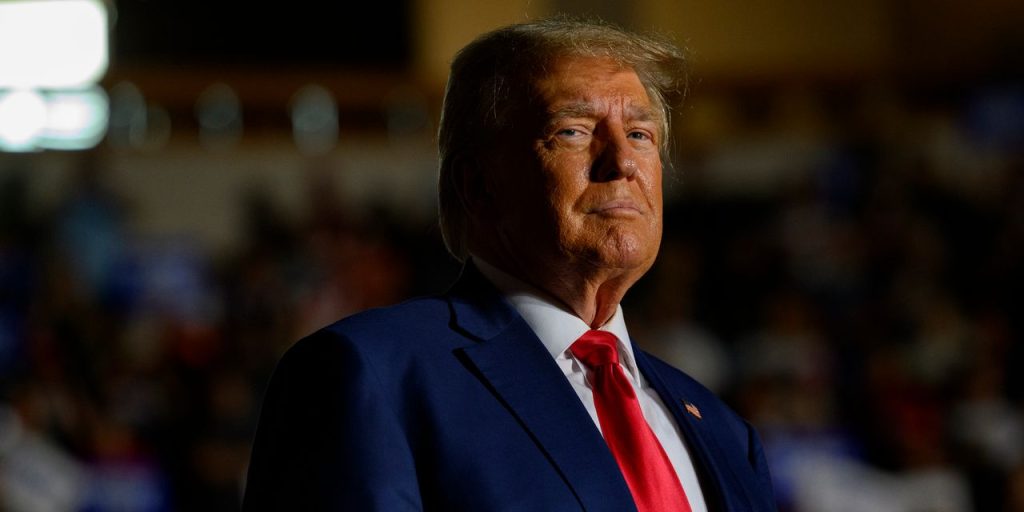Legal language can be confusing. So ahead of former President Donald Trump getting arraigned on Thursday afternoon in the Jan. 6 case, Google searches for “arraigned” and “arraignment” have climbed.
So let’s break things down, drawing from the U.S. Courts glossary and Cornell Law School’s free legal dictionary. First up: Let’s define “indictment.”
Trump was indicted by a grand jury in Washington, D.C., on Tuesday in connection with the Justice Department’s investigation into efforts to overturn the 2020 presidential election, including the Jan. 6, 2021, attack on the U.S. Capitol. An indictment is what formally charges a person with a crime. During the indictment proceeding, as we saw with Trump, a grand jury decides whether there is enough evidence that the defendant committed a crime to justify having a trial. In Tuesday’s 45-page indictment, Trump was charged with four counts: conspiracy to defraud the U.S., conspiracy to obstruct an official proceeding, obstruction of and attempt to obstruct an official proceeding and conspiracy against rights.
Next up is the arraignment, which was scheduled for 4 p.m. Eastern time on Thursday. What does it mean to be arraigned? This is the first step in a criminal proceeding, in which the defendant is brought into court and told of the charges against them in the indictment. This is also when the defendant is asked to enter a plea of guilty or not guilty. Trump has denied doing anything wrong and entered pleas of not guilty.
The next hearing in the case was reportedly scheduled for Aug. 28.
Neither an indictment nor an arraignment is the same as a conviction, and Trump will be presumed innocent unless he is proven guilty. A conviction would be if the formal decision, or verdict, of a trial jury or judge determines that he is guilty of a charged offense. The onus is not on Trump or his team to prove his innocence during a trial. Rather, it is the prosecution that bears the burden of proof to convince the jury, beyond a reasonable doubt, that Trump committed a crime.
There have also been plenty of questions trending on Google searches about whether Trump could still serve as president now that he’s been indicted and arraigned, or whether being convicted of a crime would bar him from the White House. As explained here following his April indictment in the hush-money payments case involving Stormy Daniels, an indicted person can still run for president. Nothing in the Constitution prevents it. Legal experts say that Trump could still run even if he were to be convicted.
Read more here: Donald Trump has been indicted. Could he still run for president?
One interesting wrinkle, however, is that if Trump should be convicted of a felony, he would probably not be allowed to vote for himself, as 48 states bar people with a felony conviction from voting.
This week’s proceedings mark the third indictment and arraignment that the former president has faced this year.
Read more: Trump has now been indicted in a third case. Here’s where all the investigations stand.
Trump has denied wrongdoing in all these cases, and he remains the overwhelming favorite in polls for the GOP 2024 presidential nomination. The former president’s 2024 campaign has used the latest indictment as a fundraising opportunity, offering supporters who donate $47 an “I Stand With Trump” T-shirt featuring Tuesday’s indictment date. Disclosures filed Monday covering this year’s first six months show that Trump’s fundraising jumped after his Manhattan indictment in the hush-money case and saw another, smaller spike after his indictment in Miami in June in the special counsel’s classified-documents case.
Read more: Donald Trump faces Thursday arraignment as his 2024 campaign works to raise money after indictment again
What happens next? Special counsel Jack Smith, who brought the charges against Trump, said his office intends to “seek a speedy trial” in the Jan. 6 case. Trump’s defense attorney, John Lauro, has seemed to push for delaying the trial until after the 2024 presidential election, however.
Read more: Trump has now been indicted in a third case. Here’s where all the investigations stand.
Trump also faces exposure to another prospective indictment, as Fani Willis, the district attorney in Georgia’s Fulton County, said that she will announce a charging decision by Sept. 1 in her investigation into efforts to overturn that state’s results in the 2020 presidential election.
Read the full article here














